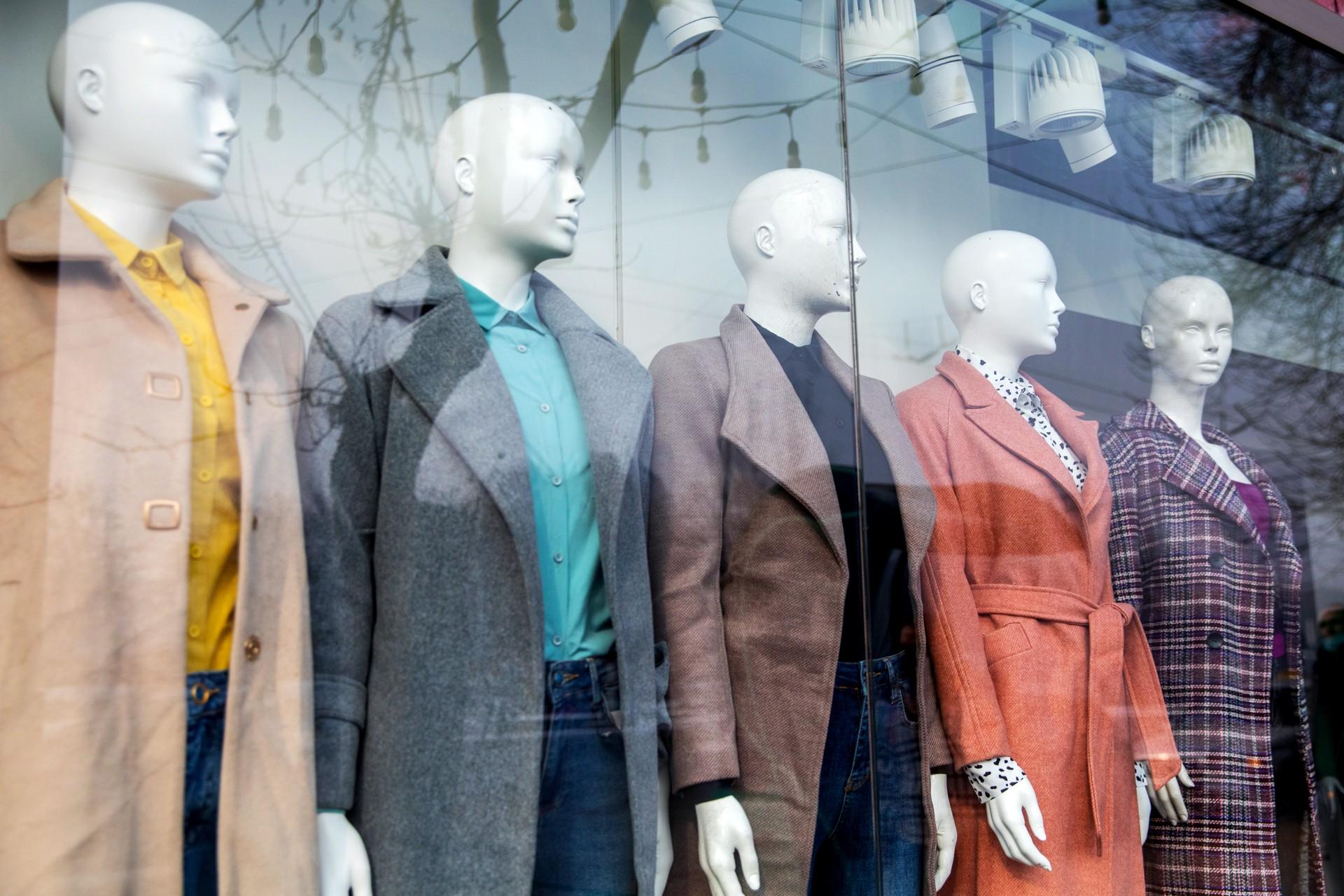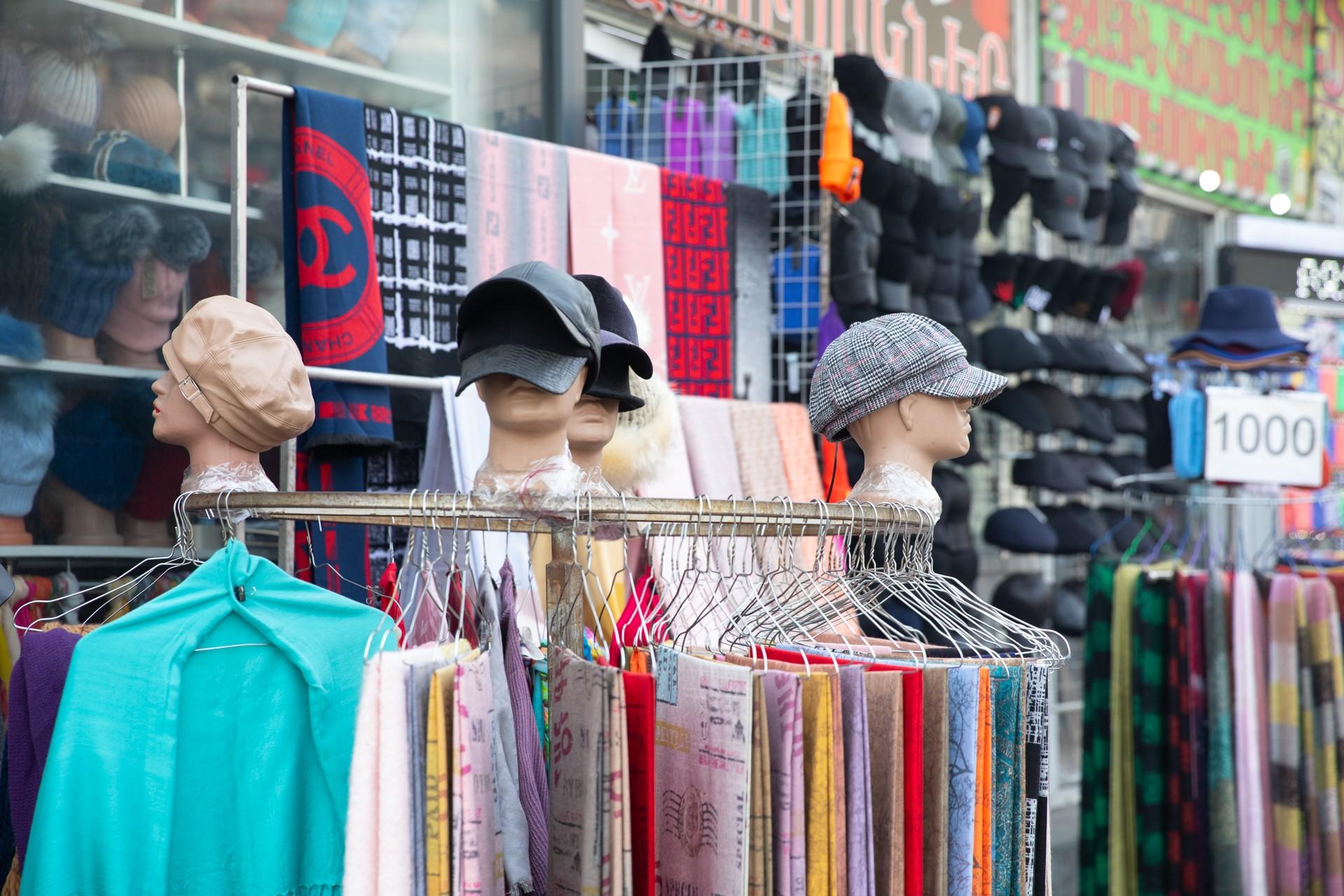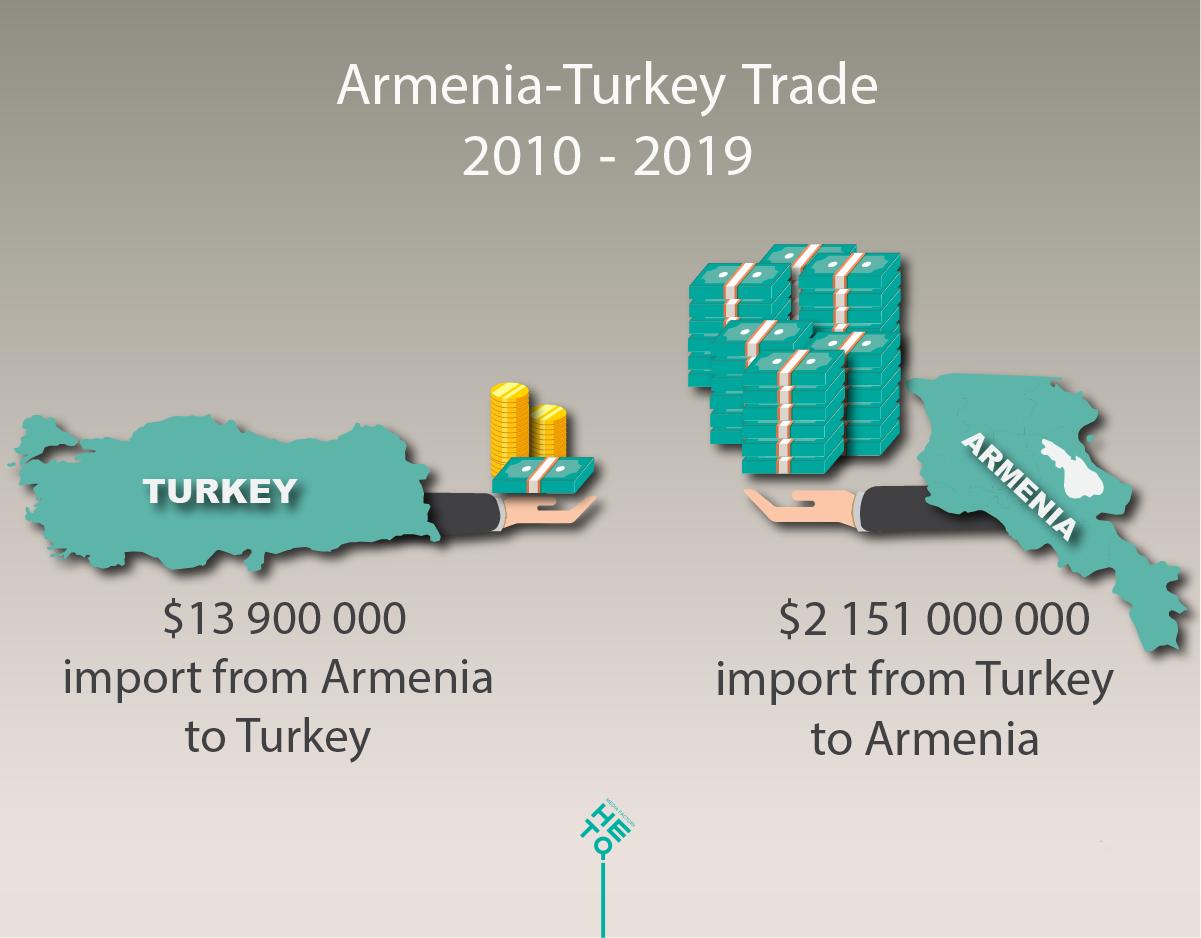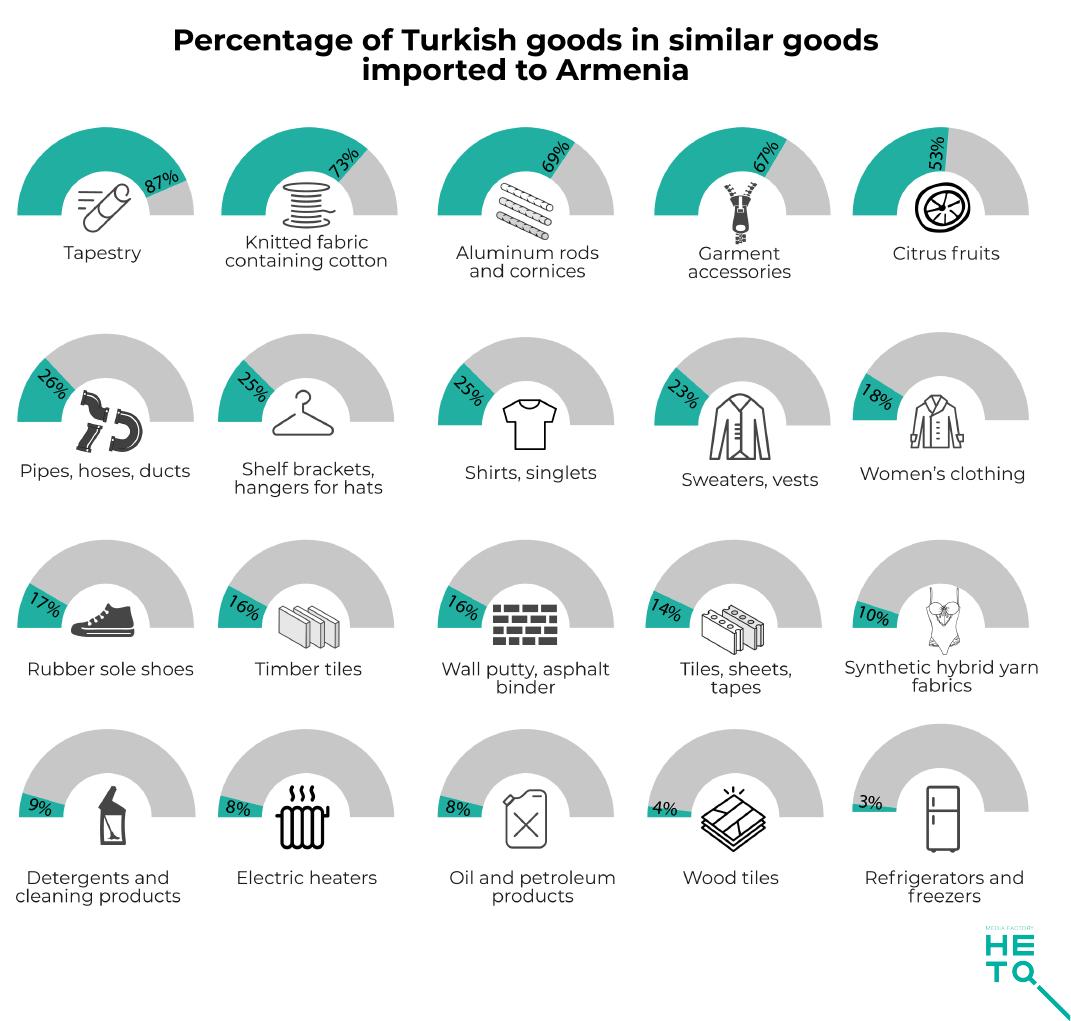
Boycotting Turkish Goods: Corruption Risks, Government Shortcomings and Importers' Concerns
In ten years (2009-2019), Armenia has imported about $2,151,000,000 worth of goods from Turkey. During the same time period, exports from Armenia to Turkey amounted to only $13,900,000.
For years there have been calls to boycott Turkish goods in Armenia. Now those calls have found legal ground. However, there are still many questions without definite answers. Is the Armenian market ready to find an alternative for Turkish goods without hurting importers and consumers? At the same time, talks about unblocking economic and transportation routes in the region are being held. This puts under question the expediency of putting an embargo on Turkish goods.
The Hetq Media Factory Corruption Reporting Evening School students have investigated the issue and discovered that some importers of Turkish goods have not found an alternative so far, the government is failing to fulfill its functions, and there are no programs directed towards choosing other markets and establishing contacts with foreign businessmen.
Aside from all of the above-mentioned issues, the embargo of Turkish goods also creates ground for corruption risks. Until time passes and the impact of the embargo of Turkish goods on the Armenian economy becomes clear, we have tried to figure out the smuggling routes through which Turkish goods can enter the Armenian market under the ban.
Six-month embargo
When the war was still flaring in Artsakh, the Armenian government passed a bill on October 20th, according to which the import of certain ready-made Turkish products would be banned starting December 31st.
In a short statement explaining and justifying the decision, the Government stated that it was based on security concerns.
As “Turkey openly encouraged and supported the war and terror acts that Azerbaijan unleashed against Artsakh”, Armenia put an end to financial contribution to Turkey’s state treasury by banning the import of Turkish goods.
In accordance with the May 29, 2014 treaty on the Eurasian Economic Commission and EEC regulations, this decision will be in force for 6 months, and after its expiry it will be possible to prolong the decision for another six months.
It is important to point out that the ban concerns ready-made Turkish goods for consumption and that raw materials needed for production do not fall under the ban. This means that local textile producers, for instance, can still import raw materials to use in their productions.
The ban was not extended to the import of Turkish raw materials so that local producers would not be harmed. Firstly, it is difficult to find alternative markets for raw materials in a short period of time, and this could harm local producers. Secondly, after importing raw materials local producers create new products and new value, which can be impeded if the import of raw materials is banned.
Armenian-Turkish trade: Negative balance and dependence on product markets
During 2010-2019 Armenia imported goods worth $137,000,000-$270,000,000 from Turkey annually. In contrast, there is no demand for Armenian goods in Turkey. In addition, the Turkish government has technically hindered the entry of Armenian products into the Turkish market through various custom levers. As a result, Armenia mainly plays the role of importer in Armenian-Turkish trade relations; Armenian export to Turkey is minimal.
According to data provided by the Statistics Committee (RA SC), goods worth $268,000,000 were imported from Turkey to Armenia in 2019. Armenia’s share of Turkish exports is 0.1%, while imports make up 4.9%. Data has not been summarized yet for 2020; therefore, we have based our investigation on 2019 data.
Simply for comparative purposes, let us say that the share of Armenian exports in Turkey was only 0.1%.
This would mean that, in total, over 10 years (2009-2019) Armenia has imported goods worth $2,151,000,000 from Turkey, while Turkey has imported goods worth only $13,900,000 from Armenia.
Infographic by Susina Khachatryan, Hetq Media Factory
Based on calculations conducted by Armenia’s Ministry of Economy, Armenia imports mainly final consumer goods from Turkey, which make up around 80% of total imports. The rest are intermediate goods, that is, raw materials.
Despite the fact that Turkish products comprise only 4.9% of total Armenian imports, 50-90% of certain imported goods in Armenia have Turkish origin, for example, knitted tapestry, cotton fabric, citrus fruits, aluminium rakes, etc.
If we look at absolute indicators of imports, we see that the top 5 goods imported from Turkey are petroleum or petroleum-based products, knitted wear, citrus fruits, tapestry, and cotton fabric.
In this graph, Armenian-Turkish trade is presented visually and in more detail:
Infographic by Karin Manukyan, Hetq Media Factory
Importers are searching
Although the import of Turkish goods was allowed until the end of 2020, many importers had already stopped importing from Turkey by November 2020. At the same time, the importers are facing a dilemma: They are not able to decide which alternative markets to turn to, how to redefine themselves, and how to establish new connections in new markets.
“Iran could have been an alternative; it is close to us and they also have quality fabrics. However, the same quality fabric is heavier compared to the Turkish one, which means that customs clearance will be more expensive and, as a result, the cost of my product will be higher. That is why it is not profitable to import from Iran,” says Anahit Karapetyan, who imports and sells children’s clothes.
The importers are still searching. They are trying to make new trade connections in Russian, Kyrgyz, Uzbek and Chinese markets. However, it is not an easy process, and they require assistance from the State. They say that they already had trusted contacts in Turkey and that they placed orders over the phone, without needing to go over themselves. Meanwhile, it will not be possible to place orders with random, unknown suppliers. They will have to go there and get acquainted with the quality and prices, and they will have to communicate and trade several times to build trust. All this requires time and money. Some traders did not rule out going out of business for a while until the issues of new suppliers and new import markets were solved.
“It is better for me to sell the clothes I have. It’s alright, I will work without profit for some time until we find a solution. I will not import Turkish fabric for sure,” says Anahit.
For the importers, it is important to find alternatives to the Turkish products that are not only compatible in terms of price and quality standards but also in terms of design and style.
“The products in Kyrgyzstan are too colorful, with colors that scream, and the design of the clothing is also different. Clothes with such design and colors won’t sell in our market,” says Marine Ghazaryan, a vendor, who shows us a few clothing items that she is going to send to Kyrgyzstan as samples so they can sew clothes accordingly. She is not sure how well the collaboration will work out.
Despite the fact that traders and businessmen will not be able to import goods legally, there are risks that nevertheless there will be attempts to smuggle Turkish goods into Armenia due to several understandable social reasons and to meet consumer demands. It is obvious that many importers will turn to the Turkish market again.
Bribes to customs officials, incorrect product registration, and more: Corruption risks against the backdrop of banning Turkish imports
Director of the ACSES analytical center Economist Haykaz Fanyan remembers that years ago many goods were imported to Armenia and then those goods were exported to Russia as Armenian products. However, in reality they were not Armenian goods. It is possible that similar mechanisms will employ Georgia, whereby Turkish goods are imported to Georgia, the country of origin is changed, and then the goods are imported to Armenia. Time will show to what extent the State Revenue Committee will be able to discover such incidents.
In addition, there are many other smuggling routes, such as importing ready-made products labeled as raw materials, bribing officials, etc. All these must be strictly controlled by customs services.
“One way to get around the restrictions is bribing officials. Such risk exists in theory; whether it will become a reality I cannot tell. When the embargo was imposed, the government studied the issue in detail and excluded certain goods like knitted fabrics that, if banned, would harm the economy. Importing certain products will be possible. Theoretically it is possible that ready-made products could be imported under the guise of raw materials. Anything is possible. Some may try to cross the border to avoid the customs checkpoint. The Armenian-Georgian border is not tightly controlled. Thousands of routes exist,” says Haykaz Fanyan.
At this stage the economist has not yet commented on to what extent the state and businesses are prepared to refuse Turkish goods. He only notes that prices on certain goods may go up.
It is no coincidence that, for years, Armenian businesses have been importing goods from Turkey. It was financially profitable in terms of logistics (close routes, cheaper freight) as well as price-quality indicators. The majority of Armenian consumers was satisfied with the average price and quality of Turkish goods, hence there has been demand for those goods for years. However, the war that Turkey and Azerbaijan unleashed on the Artsakh-Azerbaijan border pushed economic calculations into the background, giving way to politics and security.
During a phone call in December 2020, President of the Small and Medium Enterprise Cooperation Association Ruben Osipyan predicted major grievances by traders in the beginning of 2021. “We have disseminated information through our association and have asked that all those who were not able to find alternative products or have any issues reach out to us. I have not heard anything so far. I suppose they simply disregarded what we wrote. In January they will come and try to solve their issues post factum,” said Osipyan.
He thinks that many businesses have not been able to find alternatives for Turkish materials due to objective and subjective factors.
“I also still don’t know how the State is going to ensure support for those people. If a business says they are not able to find an alternative supplier, is there any state structure that will help them?” asked Osipyan.
Economist Suren Parsyan emphasizes that if a ban is imposed on the import of certain goods at the state level, it is necessary to provide an alternative, develop an import substitution strategy, and implement programs. But during this time no such program has been implemented. Anything carried out has been initiated by individuals and organizations.
“In 2016 there was a discussion around local textile producers providing Turkish sellers with domestically produced goods at cost or near-cost price for some time, so that they could capture the market and drive Turkish goods out of the market. Only the State can promote such an agreement. Meanwhile, the State has been inactive in the last two or three months,” noted Suren Parsyan.
He recalls two government decisions that have been made or voiced on this issue: one says that the import of Turkish goods should be limited, the other that we want to intensify trade and economic ties with Turkey. These decisions contradict each other. As a result, businesses that were supposed to invest in Armenia and replace Turkish goods with Armenian goods are facing serious uncertainty. He doesn’t know whether the policy will be changed in 6 months or even before 6 months is up. Initially, after the decision was made, there was a lot of activity in terms of opening replacement productions, but recently the whole process has been frozen due to uncertainty.
“Even if the import of Turkish goods is allowed in 6 months, the local production simply cannot compete in these conditions. First of all, Turkey has an economy of scale; it produces more goods. Secondly, Turkish producers receive quite a lot of state support in the form of subsidies. Third, the Turkish lira is very devalued, which allows us to export goods at incomparably cheaper prices,” says Suren Parsyan.
The Customs Service ensures that they have all necessary levers to prevent smuggling attempts
We have asked the State Revenue Committee (SRC), which includes Taxation and Customs Services, to answer the following questions: What levers does the Customs Service have to identify and prevent violations regarding changing the origin country of the products? What steps have been taken to manage the risks, as much as possible, of importing Turkish ready-made products under the guise of raw materials?
Customs answered that the origin of goods is confirmed in all cases where they find signs that the goods originated from a country where imports are prohibited.
The origin of the product is verified through the product’s certificate of origin. They check the information concerning the origin of the product as well as its authenticity and the accuracy with which documents are compiled and completed. In cases where the origin of the product is unknown and there is suspicion that there are restrictions imposed on the product, the Customs Service has the right to demand documents concerning the origin of the products.
In our inquiry, we also asked the SRC to clarify what steps they envisage to take to prevent cases whereby bribes are received or offered in the Customs Service.
The SRC informed us that compliance with the requirements of customs legislation is exercised through the application of a risk management system. However, the risk mitigation measures that are included in the system are confidential and not subject to disclosure.
The SRC also informed us that they have reached out to the Republic of Georgia for assistance in controlling goods of Turkish origin transported to Armenia via Georgia.
The Ministry of Economy has no specific programs to mitigate the negative effects of the ban on the import of Turkish goods
Since various officials and experts note that the negative effects of the ban have to be mitigated by developing local production, we also sent a request to the Ministry of Economy.
In particular, we asked if the Ministry has already made or is planning to make new decisions and adopt new regulations in the field that will boost local production development.
It is clear from the response of the Ministry of Economy that no special changes or special measures stemming from the decision of the ban are planned to promote the development of local production.
In the reply letter sent to us, signed by Deputy Minister of Economy Varos Simonyan, the Ministry analyzes from beginning to end what goods Armenia imports from Turkey that can be replaced with local goods. The Ministry does not indicate how to replace those goods. Meanwhile, this is exactly what businesses are expecting to hear from the Ministry.
The Ministry focuses on the convertibility of goods imported from Turkey that are of comparable quality. According to the Ministry, research shows that it is possible to import end products with the same quality from other countries, but they admit that the transition will take some time. For example, in the case of textiles, the Ministry directs its focus on the markets of China, the UAE, EU countries, the United States, Iran, Vietnam, Bangladesh, Indonesia, India, Russia, Peru, and Tunisia.
The Ministry also claims that such products can be produced in Armenia, pointing out the big potential of the businesses already operating in the textile field.
The Ministry’s response in full can be found here:
Only time will show the effects of the embargo of Turkish goods in Armenia. However, it is clear that desirable and safe results can only be reached through state-business cooperation and the right programs. The Ministry of Economy is already late in this regard, given that the law has already been adopted. Judging by expert predictions, both consumers and importers will suffer if we go on at this pace.
Let us remember that the ban will be in force for 6 months, after which it will be clear whether a new decision about the ban will be made or whether the government will change its position.
Authors: Anna Darbinyan, Arshaluys Barseghyan, Haykuhi Barseghyan, Samson Martirosyan
Coordinator: Seda Hergnyan
Photographer: Ani Sargsyan
 Videos
Videos Photos
Photos



Write a comment